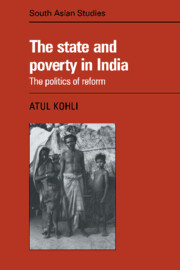Book contents
- Frontmatter
- Contents
- List of Tables and Figures
- Acknowledgements
- Introduction
- 1 The State and Redistributive Reforms
- 2 Democracy and Development in India: an Interpretation
- 3 West Bengal: Parliamentary Communism and Reform from above
- 4 Karnataka: Populism, Patronage, and Piecemeal Reform
- 5 Uttar Pradesh: Political Fragmentation, Middle-Peasant Dominance, and the Neglect of Reforms
- 6 Conclusion: The State and Reform in Democratic–Capitalist Development
- Appendix I On the Political Relevance of Social Classes in a Developmental Setting
- Appendix II Does Agriculture Growth Really “Trickle-down” in India?
- Bibliography
- Index
- CAMBRIDGE SOUTH ASIAN STUDIES
5 - Uttar Pradesh: Political Fragmentation, Middle-Peasant Dominance, and the Neglect of Reforms
Published online by Cambridge University Press: 27 October 2009
- Frontmatter
- Contents
- List of Tables and Figures
- Acknowledgements
- Introduction
- 1 The State and Redistributive Reforms
- 2 Democracy and Development in India: an Interpretation
- 3 West Bengal: Parliamentary Communism and Reform from above
- 4 Karnataka: Populism, Patronage, and Piecemeal Reform
- 5 Uttar Pradesh: Political Fragmentation, Middle-Peasant Dominance, and the Neglect of Reforms
- 6 Conclusion: The State and Reform in Democratic–Capitalist Development
- Appendix I On the Political Relevance of Social Classes in a Developmental Setting
- Appendix II Does Agriculture Growth Really “Trickle-down” in India?
- Bibliography
- Index
- CAMBRIDGE SOUTH ASIAN STUDIES
Summary
Uttar Pradesh (U.P.) was the crown jewel of the 1977 Janata victory in North India. U.P. is the largest state of India. It is also the heart of the Hindi belt. The political significance of U.P. is manifest in the fact that five of India's six Prime Ministers — Nehru, Shastri, Charan Singh, Indira Gandhi and Rajiv Gandhi — began their political careers in this state. Nothing in early 1977 thus highlighted the rout of Congress(I) better than Janata's whopping 383-seat majority in the 425-seat U.P. Legislative Assembly. While U.P. had been ruled by non-Congress coalitions in earlier periods, this solid majority for a single party appeared to be something new in state politics.
In retrospect, the Janata coalition proved to be short-lived, ruling U.P. for only about three years. Janata's reformist performance during this brief rule is assessed here. Because three years is a rather short time for assessing political performance, the focus in this chapter is on the emerging trends. What was the nature of the Janata regime? And what type of reformist policies were set in motion by this new political force? These questions are analyzed here with the aim of comparing U.P.'s Janata regime with the CPM regime in West Bengal and the Congress(I) regime under Devraj Urs in Karnataka.
I document below the fact that the Janata party neglected poverty reforms: land reforms were excluded from political discussion; the much-publicized “rural tilt” toward marginal and small farmers did not materialize; and “Antyodaya” and other programs for the landless poor remained ineffective.
- Type
- Chapter
- Information
- The State and Poverty in India , pp. 188 - 222Publisher: Cambridge University PressPrint publication year: 1987
- 2
- Cited by



